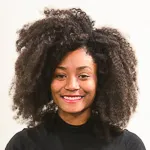I rocked a buzz cut at the age of 16 when I made a decision to stop chemically straightening my hair and “go natural.” A relaxer is the name of the chemical treatment used to straighten textured hair, and black women have been doing it for decades. Within the past few, there has been a surge in the number of black women wearing their hair in its natural curly, kinky or wavy state, and this has been coined as “The Natural Hair Movement.”
But it’s about more than just hair.
The Natural Hair Movement is about black women choosing to define themselves by their own beauty standards, and The Natural Hair Movement is not limited to only black women. It is an act of resistance to the celebrated European standard of beauty that is de facto in American society and societies worldwide.
Many people do not understand. People on Stanford’s campus do not understand.
In the summer of 2012, New York City’s Union Square was the site of the “You Can Touch My Hair” social experiment started by black hair guru Antonia Opiah. The experiment at first featured women who had signs that read “you can touch my hair,” and the public obliged. Then, women who felt differently occupied the space with signs that said, “you can’t touch my hair but you can kiss my ass” or “touch my hair with your hand & I’ll touch your face with my fist.”
Many participants wanted this event to help people who weren’t centered in the movement understand textured, kinky, curly or nappy hair. The mixed reactions and participants’ attitudes to the social experiment are the best and most salient example of the highly-charged and polarized reactions that surround “hair politics” amongst women of color, especially those with curly, kinky or textured hair.
Both sentiments should be respected.
Women who do not want random fingers exploring their tresses probably do not want to be exotified or “othered” as different. They have the right to not be touched. To put it into a historical context, black bodies have been touched without consent by people who thought they were different from them. This unapologetic touching happened on the auction block.
Additionally, the amount of work that goes into doing natural is exhausting. Natural hair women, also known as “naturalistas,” have “wash days” for a reason. The time dedicated to natural hair on any given wash day can be hours. Touching a naturalista’s hair can be rightful perceived as degrading and disrespectful.
Women who don’t mind having random fingers exploring their hair are probably willing to take on teachable moments and may want to foster human connection ignited by recognizing differences, acknowledging them and learning from them. This is just as important as realizing that touching someone’s hair may be degrading.
Whatever the individual hair politics naturalistas have, one thing can be held true: Natural hair is not easy in a society dominated by European standards of beauty.
Black women always have concerns that wearing their natural hair can prevent them from getting a job or retaining a job. Meteorologist Rhonda Lee was fired from a Louisiana news channel after she tried informing a viewer why she was wearing her hair naturally on-air.
The battle for the right to wear natural hair has been extended to schools as well. In Orlando, Florida, Vanessa VanDyke was threatened to be kicked out of school unless she straightened her natural hair with harmful heat or chemicals or simply cut it. It was “distracting.”
From the day I first cut my hair, I have had to deal with touching, stares, ignorant questions and that one co-worker who asked me if it was “crazy hair day” because I wore my hair in its natural state. At Stanford, friends have been told that their hair was “funny-looking,” “unique,” or “really different”. When I wear my hair in its natural state, it is partly political and partly out of self-love.
Black women have been chemically straightening their hair since the 19th century as a way to make their hair more socially acceptable and “beautiful.” Black hair in America has always been seen as a problem, and black women have gone through toxic and painful ways to straighten their hair.
In today’s society, we need to realize that we are not entitled to touch another human unless they so desire.
It’s about more than just hair.
Contact Mysia Anderson at mysia ‘at’ stanford.edu.
